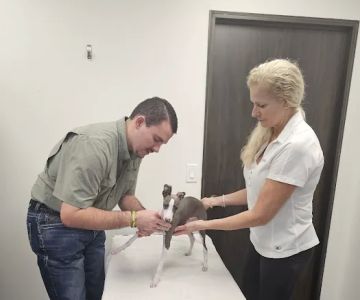Holistic Treatments for Dog Anxiety: Natural Solutions and Tips
As a dog owner, I’ve witnessed firsthand how anxiety can affect my furry friend. Dogs can suffer from anxiety for various reasons—whether it's separation anxiety, loud noises, or just general stress. I used to feel helpless watching my dog struggle with his anxiety, but after researching holistic treatments and speaking with my vet, I discovered several natural remedies that made a significant difference in his behavior. Now, I’d like to share some of these holistic solutions that you can incorporate into your pet’s care routine to help ease their anxiety in a gentle, non-invasive way.
1. Understanding Dog Anxiety: What Causes It?
Before diving into the treatments, it’s essential to understand why dogs develop anxiety. In my experience, my dog’s anxiety was triggered by a mix of factors, including loud noises during storms and separation anxiety when I’d leave the house. Understanding the root cause of your dog’s anxiety is the first step in providing effective treatment.
For many dogs, anxiety can be a result of stressors such as changes in their environment, travel, or even the absence of their primary caregiver. Dogs with anxiety often display signs like excessive barking, chewing, drooling, or trying to escape from confined spaces. It’s important to identify these signs early to begin addressing them in a timely manner.
2. Calming Natural Remedies: Aromatherapy for Dogs
Aromatherapy is a calming treatment that I discovered early on in my quest for holistic solutions. I started using essential oils, like lavender and chamomile, which have soothing properties known to reduce anxiety. However, I quickly learned that not all essential oils are safe for dogs, so I made sure to consult with my veterinarian first.
For dogs with anxiety, certain essential oils can be used in diffusers to create a relaxing atmosphere. Lavender, known for its calming properties, has worked wonders for my dog during stressful situations. You can use a diffuser in your home or even apply diluted oils to your dog’s bedding or collar. Just ensure you're using oils that are non-toxic to dogs, and never apply oils directly to your pet’s skin without guidance from your vet.
3. Holistic Supplements: Natural Supplements for Anxiety Relief
In addition to aromatherapy, I also started giving my dog natural supplements that promote calmness. Herbal remedies like valerian root, passionflower, and CBD oil have been proven to help reduce anxiety in dogs. I opted for a high-quality CBD oil supplement after consulting with my vet, and I’ve seen significant improvement in my dog’s anxiety levels. The CBD oil helped my dog remain calm during thunderstorms and other anxiety-inducing situations.
Supplements like these can help to regulate your dog’s stress levels, but it’s always a good idea to speak to a veterinarian before introducing them to ensure they are appropriate for your dog’s breed and health condition.
4. Gentle Training Techniques: Positive Reinforcement
When it comes to managing dog anxiety, training plays a crucial role. In my case, I found that positive reinforcement helped my dog feel more secure and less anxious. For example, I used treats and praise to encourage calm behavior when my dog started to show signs of stress, such as pacing or whining. This method helped him learn that he would be rewarded for staying calm.
Training sessions can also be used to desensitize your dog to stress-inducing situations. For example, if your dog is scared of certain noises, like fireworks or the vacuum cleaner, you can slowly expose them to those sounds at a low volume and gradually increase it while rewarding calm behavior. This process, known as desensitization, helps reduce anxiety over time.
5. Creating a Calm Environment: The Power of a Safe Space
Creating a stress-free environment at home has been a game changer for my dog. I made sure to provide a quiet, comfortable space where my dog could retreat when feeling overwhelmed. This area became his “safe zone,” where he could relax without any disturbances. I also made sure to keep his routine consistent, as dogs with anxiety often feel more secure when they can predict their day-to-day activities.
For your dog, you might want to invest in calming products such as a cozy bed, crate, or calming music. There are also anxiety-reducing wraps, like Thundershirts, which apply gentle pressure to your dog’s body to help them feel secure. These options can help create a calm and peaceful environment where your dog can unwind when they are feeling anxious.
6. Exercise and Mental Stimulation: Keeping Anxiety at Bay
One of the best ways to reduce anxiety in dogs is through regular physical exercise and mental stimulation. I found that taking my dog for long walks and engaging him in interactive play helped him burn off excess energy, leaving him feeling more relaxed. Additionally, puzzle toys and treat-dispensing toys keep his mind busy, which is another excellent way to prevent anxiety from escalating.
Dogs need both mental and physical stimulation to stay balanced. A lack of activity can lead to boredom, which can trigger anxiety or destructive behavior. Make sure to incorporate regular walks, playtime, and enrichment activities into your dog’s daily routine to help alleviate anxiety naturally.
Seeking Professional Help: When to Consult a Veterinarian
While holistic treatments are effective, there are times when professional help is necessary. If your dog’s anxiety becomes severe or doesn’t improve with natural remedies, it’s essential to consult with a veterinarian or an animal behaviorist. In some cases, behavioral therapy, medication, or a combination of both may be required to manage your dog’s anxiety.
It’s always better to address anxiety early, as untreated anxiety can lead to more severe issues like aggression or destructive behavior. By consulting a professional, you can ensure that your dog receives the right treatment for their specific needs.
Conclusion: Helping Your Dog Live Anxiety-Free
Managing your dog’s anxiety with holistic treatments is not only beneficial for your pet’s well-being but also helps to strengthen the bond between you and your dog. By providing a calming environment, using natural remedies, incorporating gentle training techniques, and ensuring plenty of exercise and mental stimulation, you can significantly reduce your dog’s anxiety.
If you’re looking for more information on holistic pet care or need expert guidance, consider reaching out to Hidden Brook Veterinary. They can provide personalized solutions to help your dog feel more at ease and improve their overall quality of life.











